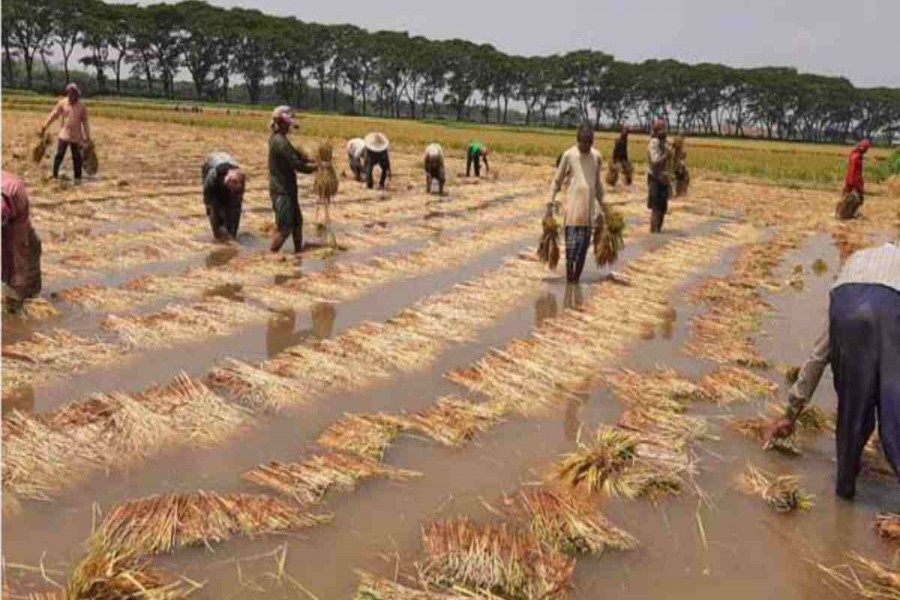In his budget speech last week, the Finance Minister mentioned that per capita income in the fiscal year 2020-21 (FY21) has risen to US$2,227, which is higher than that of many neighbouring countries including India. He also rightly said that this success of the government to maintain the macroeconomic stability has been praised by the international community.
The reasons behind the rise in per capita income are the diverse investment plans that the government has been pursuing and is still pursuing. The government ensured investments in health, education, connectivity and infrastructure from investors within and outside the country. As a long term implication, investing in these sectors helped Bangladesh to facilitate space for businesses and created skilled populations to run them swiftly.
On the other hand, Bangladesh's economic management of Covid-19 is also worth mentioning as through this, the country till now has successfully saved its economy from pandemic unlike many strong economies. Bangladesh, like most other countries, had to introduce improvised monetary policy and fiscal stimuli to tackle the pandemic effect and till now, the efforts have proved to be effective. Government introduced stimulus package which is equivalent to 4.3 per cent of total GDP and covers all necessary sectors such as industry, SMEs and agriculture. These packages are not only a one time deal, new packages are also being announced in course of time. For instance, in January 2021, government announced two new packages for small and medium entrepreneurs and grass roots populations. Apart from economic interventions, the government also chose the path of targeted interventions. The government after first wave, abandoned widespread lockdown for long term and chose the policy of targeted intervention which is found to be a better option as it allows socio-economic activities to carry on ensuring safety in low risk areas. However, the biggest keys to success were the management of migrant labour force and keeping the domestic production active amidst the pandemic.
According to KNOMAD report, amidst the Covid-19, Bangladesh's remittance grew by 18.4 per cent crossing 21 billion per annum inflow where many remittance dependant countries experienced negative growth rate. Negative growth rate or reduced growth rate at present is likely as due to pandemic and lockdowns, many migrants returned to their homeland. Travel restrictions and flight cancellations also added hurdles to this challenge. But Bangladesh managed the situation well and ensured resending these migrant workers by arranging special flights, facilitating special arrangements maintaining necessary protocols. So, most of the workers were able to join in their respective workplace smoothly. As a result, between July 2020 to April 2021, Bangladeshi migrants living abroad sent $20 billion with a 39 per cent increase over the last year. Moreover, another important step that ensured more inflow of remittance in the recent years is the introduction of 2 per cent cash incentive on remittance. Because of such attractive incentive package, most of the remittances are now coming via legal medium and is contributing to national income. Apart from cash incentives, Bangladesh has also taken necessary steps to reduce illegal transactions popularly known as 'Hundi'. The cash incentive is found to be very effective in ensuring legal transactions and right now, there are even proposals to double the incentive to 4 per cent. In the month of May, Bangladesh received $684 Million as remittance only in five days during May 2nd to May 6th. However, the sacrifices of the migrant workers are also worth mentioning. Every day, our nationals are living abroad working their heart and soul bringing prosperity to their motherland. During the pandemic, while they were in their respective workplaces, 2230 Bangladeshi nationals succumbed to COVID-19 in different countries.
Because of the massive inflow of remittance, the Forex reserve reached at 45.1 billion US dollar. As a result, Bangladesh can comfortably pay for its import expenses ensuring smooth transactions. Even, due to such height of reserve, Bangladesh is now considering to emerge as a donor country from a recipient one. Bangladesh's recent $200 million loan deal to help Sri Lanka is a case in point.
Bangladesh's industry and its management during Covid-19 has also provided a strong ground for increasing per capita income. At the initial stage, lockdowns and restrictions hampered productivity for a while but government's improvisation in policy and bringing them under the safety net lifted the situation from worsening. After the initial phase of pandemic, the government excluded Industry from lockdown and restriction protocol and decided to keep them running ensuring necessary safety measures. This policy of targeted intervention and excluding the industries from lockdown under certain protocols helped the industries to fight back against the pandemic effect. Government's stimulus package equivalent to 4.3 per capita income of GDP also helped the sector to cover its losses and prevented lay-offs. As a result, in the month of last April, the industry sector recorded $3.13 billion from export. Apart from export earnings, these industries also ensured employment domestically and reduced further unemployment rates which could create economic instability.
Bangladesh should make the best of these opportunities and must focus on creating a resilient economy with safety net encompassing all sorts of businesses of all sizes. On the eve of Bangladesh's graduation to developing country, ensuring resilience and sustainability should be given priority in economy to reap the highest benefit from these successes.
M M Rahman is a columnist


